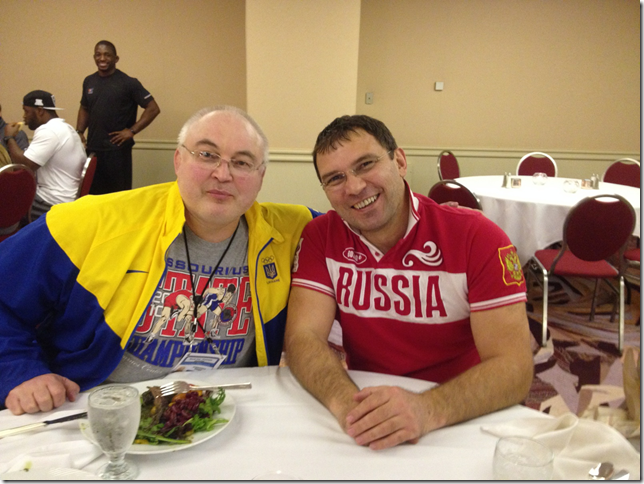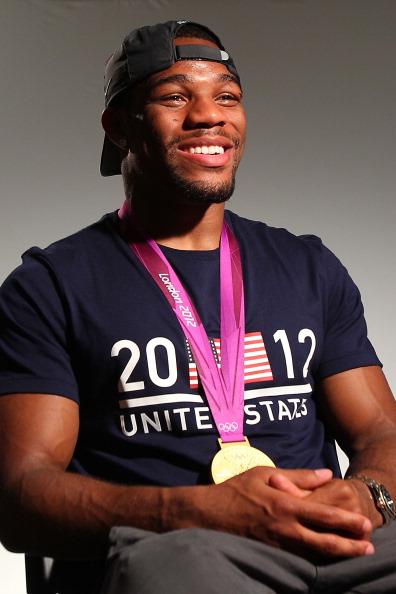Russia massed troops and armored vehicles Thursday in at least three regions along Ukraine’s eastern border, the New York Times reported. In Washington, the Obama Administration deferred a request from Ukraine’s interim government for arms and ammunition, the Wall Street Journal reported.
Here in Los Angeles, the Ukrainian and Russian men’s freestyle teams are poised to wrestle this weekend as part of the year’s biggest tournament, the 10-team World Cup. Sports diplomacy, such as it was, was left to dinner late Thursday. At a pre-meet news conference at a hotel near Los Angeles international airport, the Ukrainians weren't on hand, leaving it to the Russian coach, Christakis Alexandridris, to hit the right notes. He said, speaking through a translator, “We live in a world where we can not do about politics, nothing. From our side, all the country, our politics is wrestling. That is the main goal — to be here.”
For a sport that a year ago was literally struggling just to stay relevant, Olympic wrestling — yes, wrestling — is all of a sudden one of the most captivating, dynamic, provocative things going.
This weekend’s World Cup — at the newly renovated Fabulous Forum in Inglewood, where the Lakers used to play, you know, when they would win — is action-packed with storylines.
The annual dual-meet competition has returned to the United States for the first time in 11 years.
Last year, the meet was held in Teheran. The Iranians won. Just to set the scene — the Iranians have been first or second in the last five World Cups, seven of the last eight.
In Teheran, the Russians came in second, the Americans third.
The Ukrainians were not there. They qualified for the LA World Cup by finishing in the top 10 — fourth — at the 2013 world championships, held in Budapest. Ukraine is back at the World Cup for the first time since 2011.
Russians tend to be very big on wrestling, and if the promoters were smart, they would have made sure that in particular the Russian-speciality stores around Fairfax and Melrose avenues in LA were big boosters of this event. No less an authority than actor Billy Baldwin, the honorary chair of the weekend event who will be working the TV booth for Universal Sports, declared at the news conference that “half a million” people with some connection to Russia call Southern California home.
Another current: relations between Russia and the United States. Note that while President Obama and the Canadian prime minister, Stephen Harper, bet some beers on the outcome of the men’s and women’s hockey games at the Sochi Olympics, Mr. Obama and Vladimir Putin — not so much.
Alexandridris, again: “Our federation, our team have the best friends on the American team. They are our partners. Every political change in Russia, they have always been our friends. And we are their friends. This will carry on in the future.”
Putin, of course, played a vital role in ensuring wrestling stayed on the Olympic program, the International Olympic Committee reinstating it last September through an all-members vote.
“We are here to make sure wrestling stays in the Olympic family,” Alexandridris said, adding a moment later, “That is what we have to strive [for] — all the teams here.”
The Turkish coach, Adem Bereket? A Sydney 2000 Games bronze medalist, he spoke not Turkish but Russian at the news conference, saying he brought a young team, acknowledging that in Pool A, “Our group is very strong. We have America, Iran. We try our best.”
Were it not for the escalation of tensions between Ukraine and Russia, certainly much more attention would be paid to the matchup — Saturday evening — between Iran and the United States, again in pool play.
More background:
The 2013 World Cup in Teheran took place just after the initial IOC executive board decision to yank wrestling off the Olympic program.
Jordan Burroughs, the U.S. middleweight gold medalist at the 2012 London Games, said Thursday he had originally been scared to go to Iran. He also allowed as he had watched the movie “Argo,” about the covert operation to rescue six U.S. diplomats from Teheran amid the 1979 hostage crisis, which exacerbated his concern.
Just to make things all the more interesting — in London, Burroughs had to defeat Iran’s Sadegh Saeed Goudarzi for the gold.
As it turned out, Burroughs said, the scene in Teheran was “awesome,” the Iranian fans “great,” treating him “better than I had ever been treated in my entire life.”
Last May, as part of the Olympic reinstatement campaign, the Iranians wrestled in New York. Then they were supposed to fly directly to LA for more wrestling. Didn’t happen. They flew right back to Iran, never really explaining why.
Asked what happened, the Iranian coach, Ali Reza Rezaie, an Athens 2004 Games silver medalist, didn’t really explain why — again.
Through a translator, he said initially, “The conditions were not prepared to bring the Iranian team at that time to Los Angeles. The goal was to come to New York. After competing in New York, [we] decided to go back to Iran for some conditions.”
The follow-up question — what about now? He didn’t answer directly, saying, “There is not any specific reason. But since we came to New York, we decided not to come to LA.”
A third try: “There is not any particular problem to come to LA. Right now, here, we are here for World Cup. LA is hosting. So we are here to compete for World Cup.”
Did anybody expect anything different?
Making the Iranian pull-out last year all the more mysterious is that there absolutely, positively are hundreds of thousands who claim Iranian descent in Southern California. Indeed, Iranian fans were waiting to welcome the team — the wrestling team! — upon arrival at LAX.
Understand — in Iran, wrestlers are the soccer team in Spain, or NBA or NFL stars here in the United States.
“We really enjoy coming to the United States,” Rezaie said, adding a moment later, “We really feel at home. We don’t have any problem coming here.”
Which is why, for the United States — again, third last year in Teheran — winning the 2014 World Cup is a priority.
“This is a bullseye for us,” the U.S. coach, 1991 world champ and Barcelona 1992 silver medalist Zeke Jones said. “We want to win this competition. Make no mistake.”
And for lots of reasons:
— To grow wrestling in the West, and especially in California. Contrary to the widespread American imagination, which might fix wrestling as something done in places such as Iowa, Michigan or Pennsylvania, California is USA Wrestling’s biggest membership state, Jones said.
“If we can have just one kid be inspired,” by the likes of Burroughs or Tervel Dlagnev, the U.S. super-heavyweight, or "even by an Iranian or a Russian wrestler, it inspires them to say, ‘I want to be an Olympic champion,’ and in California, that’s a place we can do that. We have had a tremendous legacy and tradition. Stephen Abas. Dave Schultz. Mark Schultz. I mean, the list goes on and on of our great wrestlers in California.”
— To promote wrestling itself. Even though the sport saved itself last year — that was so last year. Everyone involved understands wrestling has to keep proving that wrestling is, indeed, vital.
That’s why, for instance, Burroughs appeared Wednesday night on Arsenio Hall’s talk show. It’s why, too, he had this to say Thursday:
“We definitely need to kind of portray our sport as the great sport that it is. You watch ESPN and you see poker on ESPN more often than you see wrestling. I think — I don’t think people aren’t interested in wrestling. Wrestling’s a very interesting sport. It’s a great sport. It’s extremely exciting to watch. You just have to give it to the people where they have viewership, they can see it, they can be interested in it, follow it, do a lot of different aspects of social media, be on the internet, television and all those different kind of outlets.”
Wrestling could not ask for a better spokesman than Jordan Burroughs. The man is exceptionally thoughtful and well-spoken. He also had this observation when asked what the sport needs:
“It’s going to cost a lot of money, probably, but I would put us on on TV. I would take our best athletes and just put them on a large media [platform] — 'Mike & Mike' in the morning, ESPN, 'Pardon the Interruption,' all these different shows, the Ellen DeGeneres Show, Oprah Winfrey, whatever it is. A lot of different stuff. Because wrestlers are interesting personalties and are very appealing to general audiences.
“You know when you see a football player outside of his helmet, it’s like, those sports are getting recognition. Ask a guy what he did in high school and he probably played football or he wrestled. We’ve got a number of professionals who are successful people. We’ve got a number of connections through people who understand that, who recognize it, who give us the respect that we deserve. We have been asking for it. But it’s like — we don’t have to go out and beg for attention. You know, it’s like a dog. You go to your owner and you beg for food. We don’t want to be like that. We just want to do what we do — that’s wrestle at a high level. Hopefully the recognition will come our way.”
And when, at an event like this weekend, there’s an overlay of perhaps potentially profound geopolitics?
“This is wrestling,” Jordan Burroughs said.
“Outside of all the politics, this is my occupation. I think the media kind of portrays a number of ideas on the actual event. Outside of everything that’s going on around the actual event, it’s a wrestling match. I’ve been wrestling since I was 5 years old.
“Regardless if I don’t like the guy across from me, regardless if our governments are arguing, we’re going to go out there and do what we’re best at, and that’s wrestle. We try to keep it within the circle. That circle is all that matters. Everything that’s going on outside, the turmoil, problems at home, problems with politics and governments and all that good stuff — it’s out of our reach, out of our grasp. So we just go out there and compete.”


